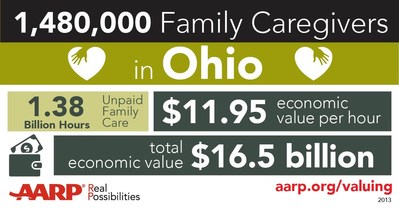COLUMBUS, Ohio, Dec. 12, 2016 /PRNewswire-USNewswire/ -- The Ohio Caregiving Act proposed by AARP Ohio and passed by the Ohio General Assembly will give important new support to more than a million family caregivers, who help parents, spouses, children with disabilities and other loved ones live independently in their homes and communities. The new act, which ensures hospital patients' designated family caregivers are offered instruction in providing needed care at home, won unanimous support in both houses of the Legislature: 31-0 in the Senate and 95-0 in the House.


Ohio is the 35th state to put a version of the AARP CARE (Caregiver Advise, Record, Enable) Act on the books.
Sponsored by Senate Health and Human Services Committee Vice Chair Peggy Lehner and Assistant Majority Whip Representative Sarah LaTourette, the Ohio Caregiving Act will help as many as 1.4 million Ohioans who provide unpaid care to parents, spouses or other loved ones. The value of this unpaid care in Ohio alone is estimated at $16.5 billion a year.
More than 70 percent of Ohio caregivers also perform complex medical tasks – though only half receive training on how to do so when a loved one leaves the hospital. Ohio voters aged 50+ overwhelmingly support the bill, with 92% saying hospitals should "explain and demonstrate" to family caregivers the medical tasks they'll need to perform when their loved ones return home from the hospital, a 2014 AARP survey found; the act makes this a requirement.
"This is a great day for family caregivers across Ohio who are doing all they can to help their loved ones live at home for as long as possible," said Barbara Sykes, State Director of AARP in Ohio. "Senator Lehner, Representative LaTourette and all of our lawmakers are making a real and positive difference in the lives of Ohioans in passing this bill."
"Information is power, and the Ohio Caregiving Act will empower Ohio's family caregivers."
"SB 314 recognizes the critical role family caregivers play in keeping their loved ones out of costly institutions. It utilizes the existing hospital discharge process to put in place some small, but meaningful supports for caregivers during hospital transitions, a difficult and stressful time for both patients and caregivers," said Senator Peggy Lehner of Kettering.
"As I have seen firsthand, family caregivers are already the 'new normal' and have become the default providers for complex chronic care in home," said Representative Sarah LaTourette from Bainbridge Township. "As Ohio's population ages, this normal will become even more critical and it will become incumbent to keep family caregivers better informed, notified, and instructed in after-care tasks, so that they have a better chance to keep their loved ones safely at home."
"I was not in the ER to advocate for my Mom when it was most needed, and they were going to send her on her way into the cold with a "follow up" appointment and some pills she couldn't swallow," said Andrea Tayek of Shaker Heights, who cares for her mother Marcia. "Now that won't happen. Family caregivers like me will be engaged at the start and allowed to play a key role in the medical care of their loved ones."
The Ohio Caregiving Act garnered vast support from a wide range of organizations representing consumers, health advocates and seniors, including the American Cancer Society Cancer Action Network, LeadingAge Ohio, Mt. Carmel Health System and the Ohio Association of Area Agencies on Aging.
"This regulation is a perfect example of how common sense solutions can be found when stakeholders work together," said State Advocacy lead for AARP Ohio, Trey Addison. "Family caregivers will be given crucial guidance on how to care for their loved ones after leaving the hospital and help older Ohioans avoid nursing homes and other institutional care. We commend our state lawmakers for working with us on this new rule."
Two other pieces of legislation supported by AARP for their impact on healthcare and independent living for Ohioans 50+ and their families were also passed; SB 311 Older Adult Influenza Vaccine Information & Education and HB 216 Nurses Scope of Practice.
Follow us on Twitter: @AARPOhio and Facebook: AARP OH
AARP is a nonprofit, nonpartisan organization, with a membership of more than 37 million, that helps people turn their goals and dreams into real possibilities, strengthens communities and fights for the issues that matter most to families such as healthcare, employment and income security, retirement planning, affordable utilities and protection from financial abuse. We advocate for individuals in the marketplace by selecting products and services of high quality and value to carry the AARP name as well as help our members obtain discounts on a wide range of products, travel, and services. A trusted source for lifestyle tips, news and educational information, AARP produces AARP The Magazine, the world's largest circulation magazine; AARP Bulletin; www.aarp.org; AARP TV & Radio; AARP Books; and AARP en Español, a Spanish-language website addressing the interests and needs of Hispanics. AARP does not endorse candidates for public office or make contributions to political campaigns or candidates. AARP Foundation is an affiliated charity of AARP that is working to win back opportunity for struggling Americans 50+ by being a force for change on the most serious issues they face today: housing, hunger, income and isolation. AARP has staffed offices in all 50 states, the District of Columbia, Puerto Rico, and the U.S. Virgin Islands. Learn more at www.aarp.org.
SOURCE AARP Ohio
Related Links
WANT YOUR COMPANY'S NEWS FEATURED ON PRNEWSWIRE.COM?
Newsrooms &
Influencers
Digital Media
Outlets
Journalists
Opted In





Share this article